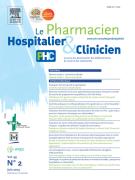Assessment of metabolic risk factors in patients undergoing antipsychotic drug therapy: A Pharmacist-led study - 26/03/21
Évaluation des facteurs de risque métaboliques chez les patients sous traitement antipsychotique : une étude dirigée par un pharmacien

This article has been published in an issue click here to access
Summary |
Introduction |
The drugs used to treat psychiatric illnesses are known as antipsychotics. Antipsychotics have a higher incidence of adverse drug reactions including extrapyramidal side effects and several other metabolic disorders. The main objective of the study is to assess the changes in anthropometric parameters of metabolic risk in patients with severe mental disorders initiated with antipsychotic drug therapy.
Materials and methods |
A prospective observational study was carried out in the psychiatric inpatient unit of a tertiary care teaching hospital for eight months. Eligible patients were enrolled and their baseline and follow-up anthropometric measurements such as body weight, body mass index (BMI), fat index, and waist-hip ratio were taken before and after six weeks of therapy. The changes were documented and analyzed.
Results and Discussion |
The most commonly prescribed antipsychotics were olanzapine, clozapine, risperidone and quetiapine. A considerable mean increase in the body weight of 4.5kg with a mean increase in body mass index of 1.7kg/m2, percentage body fat of 1.84% and the waist-hip ratio of 0.027 was observed among patients treated with olanzapine. Similarly, patients who were prescribed with clozapine also revealed a significant increase in the mean body weight of 4.7kg, an increase in BMI of 1.75kg/m2, 0.07 of waist-hip ratio and a percentage body fat of 1.4%. On analysis, patients treated with quetiapine and risperidone also showed significant changes in the anthropometric parameters.
Conclusion |
The overall comparison and statistical analysis of different anthropometric parameters suggest that the changes observed within the parameters were a result of antipsychotic drug therapy.
El texto completo de este artículo está disponible en PDF.Résumé |
Introduction |
Les médicaments utilisés pour traiter les maladies psychiatriques sont appelés antipsychotiques. Les antipsychotiques ont une incidence plus élevée de réactions indésirables aux médicaments, y compris des effets secondaires extrapyramidaux et plusieurs autres troubles métaboliques. L’objectif principal de cette étude est d’évaluer les changements des paramètres anthropométriques du risque métabolique chez les patients atteints de troubles mentaux sévères initiant un traitement médicamenteux antipsychotique.
Matériels et méthodes |
Une étude observationnelle prospective a été menée dans l’unité d’hospitalisation psychiatrique d’un hôpital universitaire de soins tertiaires pendant huit mois. Les patients éligibles ont été recrutés et leurs mesures anthropométriques de base et de suivi telles que le poids corporel, l’indice de masse corporelle (IMC), l’indice de graisse et le rapport taille-hanches ont été prises avant et après six semaines de traitement. Les changements ont été documentés et analysés.
Résultats et discussion |
Les antipsychotiques les plus couramment prescrits étaient l’olanzapine, la clozapine, la rispéridone et la quétiapine. Une augmentation moyenne considérable du poids corporel de 4,5kg avec une augmentation moyenne de l’indice de masse corporelle de 1,7kg/m2, un pourcentage de graisse corporelle de 1,84 % et un rapport taille-hanches de 0,027 a été observée chez les patients traités par olanzapine. De même, les patients à qui on a prescrit de la clozapine ont également révélé une augmentation significative du poids corporel moyen de 4,7kg, une augmentation de l’IMC de 1,75kg/m2, 0,07 du rapport taille-hanches et un pourcentage de graisse corporelle de 1,4 %. Lors de l’analyse, les patients traités par la quétiapine et la rispéridone ont également montré des changements significatifs dans les paramètres anthropométriques.
Conclusion |
La comparaison globale et l’analyse statistique de différents paramètres anthropométriques suggèrent que les changements observés dans les paramètres étaient le résultat d’un traitement médicamenteux antipsychotique.
El texto completo de este artículo está disponible en PDF.Keywords : Anthropometric parameters, Antipsychotics, Metabolic risk factors
Mots clés : Paramètres anthropométriques, Antipsychotiques, Facteurs de risque métaboliques
Esquema
Bienvenido a EM-consulte, la referencia de los profesionales de la salud.
El acceso al texto completo de este artículo requiere una suscripción.
¿Ya suscrito a @@106933@@ revista ?

